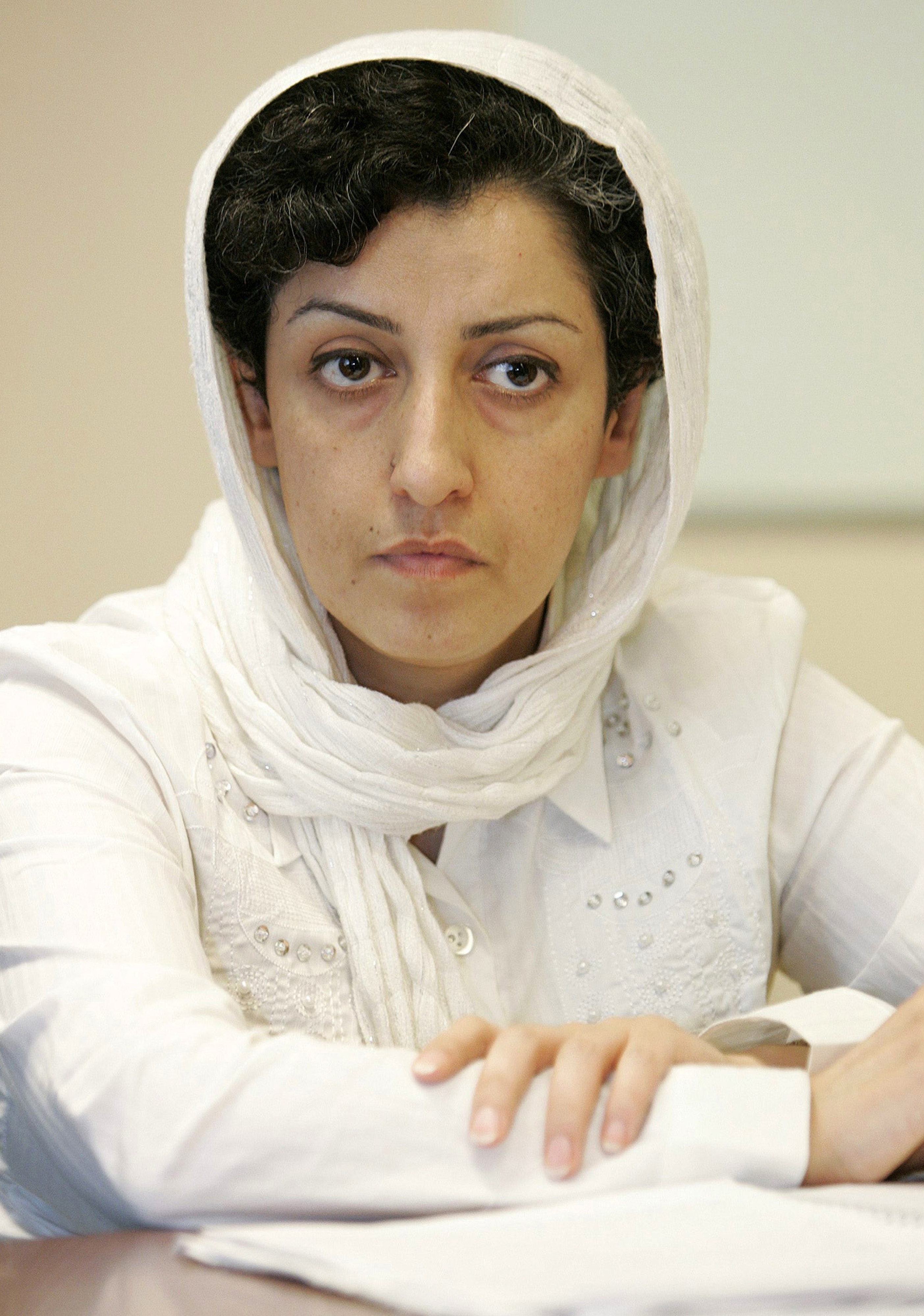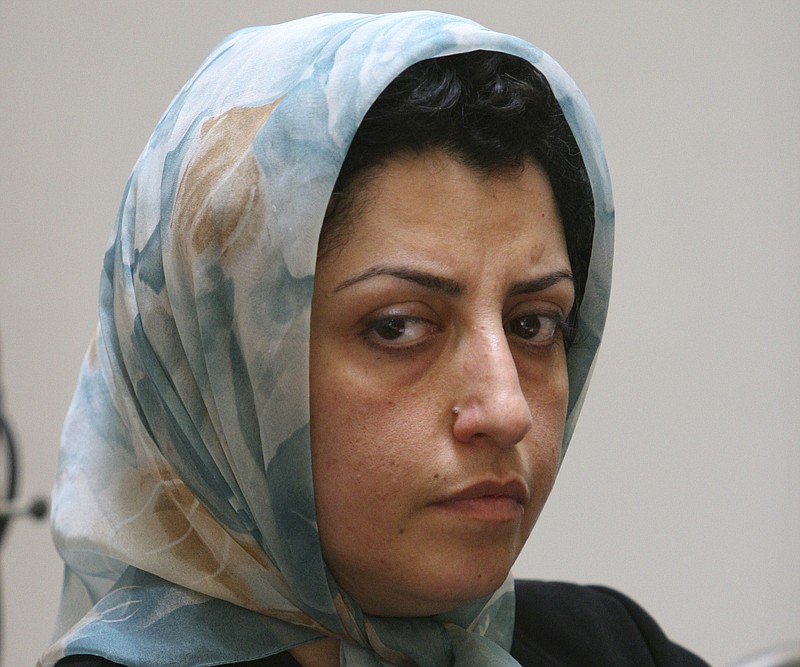DUBAI, United Arab Emirates -- Nobel Peace Prize laureate Narges Mohammadi began a hunger strike Monday over being blocked along with other inmates from getting medical care and to protest the country's mandatory headscarves for women, a campaign advocating for the activist said.
The decision by Mohammadi, 51, increases pressure on Iran's theocracy over her incarceration, a month after being awarded the Nobel Prize for her years of activism despite a decadeslong campaign by the government targeting her.
Meanwhile, another incarcerated activist, lawyer Nasrin Sotoudeh, reportedly needs medical care she has yet to receive. She was arrested while attending a funeral for a teenage girl who died under disputed circumstances in Tehran's Metro while not wearing a hijab.
The Free Narges Mohammadi campaign, citing a statement from her family abroad, said she sent a message from Evin Prison on Monday and "informed her family that she started a hunger strike several hours ago." It said that for weeks, Mohammadi and her lawyer have sought her transfer to a specialist hospital for heart and lung care.
Days earlier, Mohammadi's family described her as suffering from blockages in three veins and lung pressure. Despite that, they said, prison officials refused to take Mohammadi to the hospital because of her refusal to wear the hijab.
"Narges went on a hunger strike today ... protesting two things: The Islamic Republic's policy of delaying and neglecting medical care for sick inmates, resulting in the loss of the health and lives of individuals [and] the policy of 'death' or 'mandatory hijab' for Iranian women," the statement read.
It said the Islamic Republic "is responsible for anything that happens to our beloved Narges." It later described Mohammadi as "only consuming water, sugar and salt" while refusing to take medicine.
The Norwegian Nobel Committee, which awarded Mohammadi the peace prize, said it was "deeply concerned" about the laureate's health.
"The requirement that female inmates must wear a hijab in order to be hospitalized is inhumane and morally unacceptable," said Berit Reiss-Andersen, the chair of the committee. "Narges Mohammadi's initiation of a hunger strike demonstrates the seriousness of the situation. The Norwegian Nobel Committee urges the Iranian authorities to provide Narges Mohammadi and other female inmates ... whatever medical assistance they may need."
Activist groups also reported that Mohammadi had begun a hunger strike.
"Just last week, Mohammadi was denied access to medical treatment at an outside hospital due to her refusal to adhere to compulsory hijab requirements during the transfer to the medical facility," the group Human Rights Activists in Iran said.
Iranian officials and the country's state-controlled television network did not acknowledge Mohammadi's hunger strike, which is common with cases involving activists there. Iran's mission to the United Nations did not respond to a request for comment.
For observant Muslim women, the head covering is a sign of piety before God and modesty in front of men outside their families. In Iran, the hijab -- and the all-encompassing black chador worn by some -- has long been a political symbol as well, particularly after becoming mandatory after the 1979 Islamic Revolution.
While women in Iran hold jobs, academic positions and even government appointments, their lives are tightly controlled in part by laws like the mandatory hijab. Iran and neighboring Afghanistan remain the only countries to mandate that. Since Mahsa Amini's death, however, more women are choosing not to wear the head covering despite an increasing campaign by authorities targeting them and businesses serving them.
Amini, 22, died in 2022, several days after she was arrested in Tehran by the country's "morality police" for violating hijab laws.
Mohammadi has kept up her activism despite numerous arrests by Iranian authorities and spending years behind bars.
In October, teenager Armita Geravand suffered a head injury while in the Tehran Metro without a hijab. Geravand's parents appeared in state media footage saying a blood pressure issue, a fall or perhaps both contributed to their daughter's injury. Activists abroad have questioned whether Geravand may have been pushed or attacked for not wearing the hijab. She died weeks later.
Authorities arrested Sotoudeh, a 60-year-old human rights lawyer, while she attended Geravand's funeral. PEN America, which advocates for free speech worldwide, said last week that "50 police and security personnel charged at the peaceful group, beating some and dragging others across gravestones as they were arrested."
 FILE - Iranian activist Narges Mohammadi, delegate of the Center for Human Rights Defenders, attends a press conference in the U.N. headquarters in Geneva, Switzerland, June 9, 2008. A campaign urging Iran to free Nobel Peace Prize laureate Narges Mohammadi said Monday, Nov. 6, 2023, that the activist had started a hunger strike over the conditions of her imprisonment and the country's mandatory headscarf for women. (Magali Girardin/Keystone via AP, File)
FILE - Iranian activist Narges Mohammadi, delegate of the Center for Human Rights Defenders, attends a press conference in the U.N. headquarters in Geneva, Switzerland, June 9, 2008. A campaign urging Iran to free Nobel Peace Prize laureate Narges Mohammadi said Monday, Nov. 6, 2023, that the activist had started a hunger strike over the conditions of her imprisonment and the country's mandatory headscarf for women. (Magali Girardin/Keystone via AP, File)